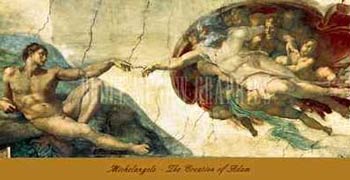Spring, 2018
![]()
![]()
| Class meets: W/F 8:10-10:00 AM in 2-13 Office: 47-35G, tel. 756-2636 (note: I am only in my office for office hours -- email is best for communication) Office Hours: M 8:10-10 AM, T/Th 12:30-1:30 PM, and by appt. |
 |
Dr.
Debora B. Schwartz e-mail: dschwart@calpoly.edu ENGL Dept.: 756-2597 |
![]()
![]() Site Navigation
Site Navigation
 |
Calendar of Assignments: Please note that the on-line syllabus (not any printout you might make) is authoritative. Assignments may be modified in the course of the quarter. Check the on-line syllabus regularly (before each class) to ensure that you are completing correct assignment. |
| Course Information: | |
|
Graded and Written Work:
|
![]()
![]()
![]()
![]() Course Description and Objectives:
Course Description and Objectives:
ENGL 204
presents significant writers and literary works of the English
Renaissance and early seventeenth century in their historical
and cultural context and points to connections between
these works / authors and their Colonial American counterparts.
Despite an astonishing proliferation of English writings during
this period (due to the shift from a manuscript to a print
culture, the increasingly literate populace, the Humanist and
Reformation movements, among other factors), English was still
considered less "literary" than Latin and Greek, the languages of
classical antiquity. While tracing the evolution of three
principal genres -- lyric poetry, theater, and the
epic -- we will explore the ways in which Renaissance and
early seventeenth-century writers sought to establish and defend
the literary legitimacy of the English tongue.
In addition to the tension between Latin and the vernacular,
we will notice other tensions -- between various religious and
political factions, between European "civilization" and
the New World, between the genders -- as they are
reflected in our readings.
![]()
| Required
Texts 1) Available for purchase at El Corral: 
|
![]()
Much of what is presented will be new to most of you, and many of the readings reflect assumptions and ideas that appear strange to a twenty-first-century audience. For these reasons, several remarks are in order.
1) Survey courses cover lots of ground, and can be frustrating at times. The material is complex and challenging, the pace brisk. Invariably, there will be topics/authors that you find hard to grasp or simply don't enjoy. When this occurs, please keep in mind that you are not expected to master ANY of the material presented to the same degree as in a course with a narrower focus. This reminder does NOT mean that you do not need to read carefully. It DOES mean that you should not torture yourself if the details of a given text prove difficult to grasp. We are looking for the broad picture, not the close-up; the idea is to provide you with a sense of the way in which English literature -- and English perceptions of what literature is -- evolved during the course of the Renaissance and early seventeenth century. Readings will be considered as cultural artifacts, contextual evidence reflecting the "world view" of the author and period in which they were written.
2) During this period, literature was intimately linked with both politics and religion. There was no separation of Church and State: religion played a significant role in educational opportunities, social standing, and career success. For this reason -- and because the Bible, along with classical literature, was the primary model for the Book in the Renaissance -- many readings deal with Christian themes. We will approach them as cultural artifacts rather than articles of faith, attempting to understand the society which produced them and the world view they represent. While students familiar with the Bible will find this background useful, no prior knowledge of Judeo-Christian tradition is assumed or required. If something puzzles you, try the following (in this order!): a) check the footnotes and/or introduction to see if an explanation is provided; b) consult a dictionary or encyclopedia; and c) ask about it in class or office hours. (Chances are, someone else is just as puzzled as you are!)
3) Due to time constraints, class
will focus on interpretation rather than description. Familiarity
with the assigned background and primary readings will be assumed.
Readings will NOT be summarized in class (which ideally should
combine discussion with lecture). Thus, the success of ENGL 204
depends largely on you. Please make a personal commitment to come
to class regularly, punctually, and prepared. Without these
preconditions, ENGL 204 will be of little use to you -- and no fun
for any of us! SO: be prepared for an intense quarter. But also
remember that I LOVE teaching this stuff, and expect to have fun!
![]()
| |
![]()
 Communicating:
Communicating:
You are expected to have an email account and to check it
regularly. Important announcements will be sent over the class
email alias. Email aliases are
automatically generated using the email address in each enrolled
student's account in the Cal Poly Directory server. If your Cal
Poly email account is NOT your preferred email address, you must
![]()
Participation 1: Attendance Policy: Due to the twice-weekly format, any absence causes you to miss a substantial chunk of material. Regular and punctual attendance is required. Please note that EVERY absence will affect the participation component of your final course grade.
 Each student starts out with
a 4.0 for attendance. This component of your final grade
drops by .3 for the first UNEXCUSED absence; the penalty
increases by .1 for each subsequent unexcused absence (from A
[4.0] to A- [3.7] to B+ [3.3], to B- [2.8], etc.).
Additionally, it drops .1 for the first EXCUSED absence
(4.0 to 3.9) and .2 for the second excused absence (3.9 to
3.7). Excused absences in excess of two (a full
week, 10% of the class) count the same as unexcused absences.
Each student starts out with
a 4.0 for attendance. This component of your final grade
drops by .3 for the first UNEXCUSED absence; the penalty
increases by .1 for each subsequent unexcused absence (from A
[4.0] to A- [3.7] to B+ [3.3], to B- [2.8], etc.).
Additionally, it drops .1 for the first EXCUSED absence
(4.0 to 3.9) and .2 for the second excused absence (3.9 to
3.7). Excused absences in excess of two (a full
week, 10% of the class) count the same as unexcused absences.
Please note that only absences resulting from illness, a family emergency, or circumstances truly beyond your control count as excused. Absences taken for personal convenience are a matter of choice rather than necessity; they will be recorded as unexcused. Please note that deadlines for other courses, work conflicts and job interviews are NOT valid reasons for missing class. Exception: a graduating senior will be granted ONE excused absence for an out-of-town job interview.
FOR ANY ABSENCE TO BE EXCUSED, you must communicate with me in
writing, either from your Cal Poly email account or on a hard-copy
note signed by you. Include the course number, the date you
missed class, and an explanation of the circumstances leading to
your absence.
![]()
Participation
2: Intellectual Engagement and Collaboration. In
addition
to regular class attendance, the 35%
participation component of your final
course grade will reflect your intellectual engagement with
the material and your willingness to collaborate with your
peers as demonstrated through participation in an online PolyLearn
discussion board and through peer editing.
The Peer-Editing assignment requires filling out a hard
copy print-out of the Essay Evaluation Checklist
available on Polylearn; writing editing suggestions on
the first draft of the classmate's essay using the Error
Codes at the bottom of the Essay Evaluation Checklist;
CIRCLING on that checklist ALL error codes used in peer-editing
the first draft ME; and writing an end comment with at
least one constructive suggestion as to how the ME might be
strengthened or expanded. Be sure that you include your
name AND the name of the person whose ME you are peer-editing on
both the marked-up first draft AND the filled out
checklist. (E.g., ME by NAME; feedback by peer editor YOUR
NAME).
![]()
No prior
familiarity with the Renaissance and early seventeenth century is
presupposed for ENGL 204 -- I will endeavor to give you all the
guidance you need for an initial reading of these works. Do
the assigned readings conscientiously, USING THE STUDY GUIDES,
and you will do fine. If you're having problems, please come
see me about it!!
 ENGL 204 is reading-intensive.
You will need more time for these readings than for a similar
number of pages in a modern novel. Budget time to complete
readings BEFORE class on the date assigned. Read background
materials first; they provide the context within which primary
readings will be most meaningful. If you run out of time, don't
skip class; read the headnote and as much as possible of the
primary readings, and go back to fill in the details after class
discussion.
ENGL 204 is reading-intensive.
You will need more time for these readings than for a similar
number of pages in a modern novel. Budget time to complete
readings BEFORE class on the date assigned. Read background
materials first; they provide the context within which primary
readings will be most meaningful. If you run out of time, don't
skip class; read the headnote and as much as possible of the
primary readings, and go back to fill in the details after class
discussion.
Study Guides are provided on the class website -- USE THEM!! Guides both provide background information and ask you questions to consider and seek answers for as you read. Use the Study Guides conscientously, and you will be adequately prepared for reading quizzes.
Suggested Preparation Method: Familiarize yourself with the study questions BEFORE you begin to read and refer to them frequently AS you read, jotting down notes as you go along. Upon completing your readings, you are advised to reread the questions and write up a summary of your ideas. This summary will NOT be collected or graded, but will be help you prepare for quizzes, papers and exams -- and class discussion!
Readings are to be completed BEFORE coming to class on the date assigned. Introductions and other background readings should ideally be read first; they are the context within which primary readings will be most meaningful. The Introductions to the Sixteenth and Early Seventeenth Centuries in the Norton Anthology provide an overview of historical developments; see also the headnotes to individual authors and works. Also useful are parts of three appendices: the British monarchs from the House of Tudor through the House of Stuart (Restored); "Religions in England"; and "Poetic Forms and Literary Terminology." Other background information is provided in online or e-reserve readings and on study guides. Please note that this background material is an integral part of the course and will be covered on reading quizzes and exams. When reading primary texts, refer conscientiously to the critical apparatus (footnotes, glossary, etc.).
Be prepared to DISCUSS readings in class. Note that length and difficulty of assignments vary, so look ahead in the reading list when you are planning your time. You are responsible for ALL the assigned readings, whether fully discussed in class or not, and for material covered in handouts, lectures and discussions.
![]()
Graded Work:

 POSSIBLE READING QUIZZES: In the past,
I used weekly reading quizzes to keep students on their toes, to
ensure that assigned readings were actually read, and to habituate
students to learning essential background information as we go
along rather than leaving it all to be crammed into your weary
brains as you review for exams. These ENGL 204 quizzes
incorporated factual questions (author names and biographical
information, including social class, education, and
religious/political affiliation; titles, dates, genres and forms
of works; etc.) based on assigned introductions and information
provided in study guides or assigned background readings.
Quizzes also contained passage IDs from the assigned primary
readings.
POSSIBLE READING QUIZZES: In the past,
I used weekly reading quizzes to keep students on their toes, to
ensure that assigned readings were actually read, and to habituate
students to learning essential background information as we go
along rather than leaving it all to be crammed into your weary
brains as you review for exams. These ENGL 204 quizzes
incorporated factual questions (author names and biographical
information, including social class, education, and
religious/political affiliation; titles, dates, genres and forms
of works; etc.) based on assigned introductions and information
provided in study guides or assigned background readings.
Quizzes also contained passage IDs from the assigned primary
readings.
These quizzes were highly effective in motivating students to
keep up with readings and learn the assigned material, and while
students initially found them intimidating, they were frequently
mentioned on course evaluations as a valuable part of the class.
BUT . . . quizzes take up a lot of time -- both class time that
could otherwise be used for discussion, and the instructor time
necessary to write and grade them. SO. . . rather than
including quizzes in the graded work, I will provide copies of old
quizzes to be used as study guides for the midterm and final
exams.
NOTE: If I perceive that students are not keeping up with the readings, I reserve the right to reinstate weekly reading quizzes. In this case, the Participation, Mini-Essays, and Reading Quiz components of the final course grade will be worth 10 % each.
POLYLEARN DISCUSSION BOARD postings: Each student will be assigned to a Polylearn Discussion Board group of 6-8 students. You will practice your analytic writing and close reading skills by posting a series of ungraded, two-page Polylearn Discussion Group Mini-Essays [= "MEs"] and ungraded, 1-2 paragraph Classmate Responses [= "CRs"] to MEs posted by your peers. Ungraded MEs and CRs count towards your Intellectual Engagement and Collaboration grade AND are REQUIRED in order to receive credit for the GRADED REVISED/EXPANDED ME-BASED PAPER that counts for 15% of your final course grade. Both MEs and CRs will require close reading of supporting quotations from assigned texts.
MINI-ESSAY LOGISTICS:
Each student will be assigned to a Polylearn Discussion
Group of 6-8 students. You must post six
two-page MEs
to your Polylearn Discussion Group by no later than
midnight on the dates indicated on the Calendar of Assignments (three MEs
before and three after the midterm exam). MEs 1-2 and 4-6 will be
thematic analyses focusing on a topic of your choice; ME 3 will be
a sonnet analysis which must articulate the central message
of ONE of the assigned sonnets and explain how the formal
aspects of the poem help to convey that meaning.
Based upon Discussion Group CR feedback, optional visits to the
Writing Center and conversations with your instructor during an
Office Hour, and the required Peer-Editing Feedback, you will revise
ONE ME and submit it in hard copy (along with the
Peer-Edited initial draft and Essay Evaluation Checklist) for
instructor feedback and a grade.
-- MINI-ESSAY SPECIFICS:
These short assignments are designed to make you attentive to
details in the works under discussion. They should be narrowly
focused on topics that can be covered within the
two-page
target length. The two-page target length
will also oblige you to get
to the point (lead with your conclusion; articulate
your claims fully and explicitly; avoid broad statements and
generalities; no "hook!"); to cut out unnecessary wordiness ("dead wood"); and to express your
ideas clearly and concisely.
MEs may be a response to a study question, an analysis of how a
specific aspect of a work helps communicate an author or
director's message or intentions, or a comparison of a specific
element with an analogous element in a previously assigned
work. Regardless of the topic you choose, mini-essays MUST
include analysis and
interpretation of carefully chosen citations from the
text. An effective ME uses close reading
of carefully chosen
textual evidence to support an interpretive claim about
the text or film. You will need a narrow focus so
that you can really "unpack" the language and/or images in the
scenes and passages you discuss without exceeding the
two-page target length. Careful analysis of a
single character, a specific relationship, a key image, or an
important scene or speech may be enough to fill two pages.
MEs should present a logically
organized argument to demonstrate the validity of an
explicitly stated interpretive
claim; don't simply describe elements in the
text or summarize
plot. You have freedom to explore an aspect of an
assigned text that interests you, but you must keep your focus on
the text itself, not background information or the way in
which the text speaks to you on a personal level. You may
find it helpful to begin by brainstorming in response to a
question on an online Study Guide; to explore how a key image
or theme is presented in a limited number of passages
within your chosen text; or to analyze an author's use of a
literary device that is of interest to you. Whatever
topic you choose, your ME must be grounded in close
reading: interpretive
analysis of specific passages and scenes. You
will discover that close attention to specific imagery, word
choice, etc. in a single descriptive passage or significant
scene may be enough to fill your two-page target length!
For fuller details, see the Mini-Essay Assignment
Guidelines and the Essay
Evaluation Checklist. NOTE: You should familiarize
yourself with this checklist before you start to write, and take
care to avoid the issues and errors that are included on the Checklist
and in the Grading
Codes!
POSTING GUIDELINES: Mini-Essays are due no later than midnight on the Fridays indicated on the Calendar of Assignments. The text of your Mini-Essays must be pasted into the message field of your Discussion Group posting so that classmates can respond to it in a Discussion thread. Additionally, you must attach your ME as a .docx file so that I can easily access an electronic copy of all MEs (and evaluate the changes made to graded papers during the revision process).
-- IMPORTANT: in order to
receive credit for each ME, you must post at least two short
(but thoughtful) Classmate
responses [= "CRs"] to MEs posted by two
members of your Polylearn Discussion Group (with whom you may
agree or disagree, as long as you do so respectfully and back up
your response with your own textual support). CRs
must including at least one ADDITIONAL quotation from the text
(i.e. a quotation that was not included in the ME to which you are
responding) in support of your observations. CRs are due no
later than midnight on the Mondays indicated on the
Calendar of Assignments.
Your twelve CRs submitted over the course of the quarter will not be graded as Written Work, but they are required to get credit for the ME REVISION/EXPANSION PAPER you will submit for a grade; additionally, CRs, like MEs, factor into the Intellectual Engagement and Collaboration component of your final course grade. Each missing ME and each missing CR counts as an Unexcused Absence.
 GRADED
PAPER: 1) A sonnet
analysis (2-3 pages, due F 1/31) on a sonnet of your
choice found in the Norton Anthology by one of the assigned
sonnet-writers.
GRADED
PAPER: 1) A sonnet
analysis (2-3 pages, due F 1/31) on a sonnet of your
choice found in the Norton Anthology by one of the assigned
sonnet-writers.
2) final graded paper, an expansion and revision of ME 1 through 4. This essay should be literary analysis incorporating close reading of one or at most two works/authors read this quarter. As you choose your topic, bear in mind that the work(s) which are the focus of your graded paper are off-limits for the essay you write as part of the Final Exam.
-- EXTRA CREDIT possible for in-class performance of a monologue or scene from Marlowe's Dr. Faustus or Shakespeare's Tempest (if interested, see me to set up a performance date). Additional points for creativity, costumes, props and memorization!!!
![]()
Grading:
| 35% | Participation, Intellectual Engagement, and Collaboration (based on attendance; submission of 6 ungraded MEs and 12 ungraded CRs to your PolyLearn Discussion Group; completion of Peer Editing Assignment for one member of Discussion Group) |
| 15% | Revised/Expanded ME-Based Paper:
turned in (along with hard copy of a classmate's
Peer-Editing Assignment) for detailed instructor feedback
and a Grade. |
| 20% | Midterm (Exams component, 50% of final course grade, will be based upon cumulative total of exam points earned on 200 pt. midterm and 300 pt. final). |
| 30 % | Final Exam (Exams component, 50% of final course grade, will be based upon cumulative total of exam points earned on 200 pt. midterm and 300 pt. final). |
OH MY GOSH . . . CAN I HANDLE THIS CLASS??
Of course you can -- if you keep up with readings and use study guides / old reading quizzes to help you learn material as you go along! But if you have a heavy course- or work-load this quarter, be sure to budget time for this class.
Finally . . . I LOVE teaching this stuff, and I'm told that my enthusisam makes my classes more fun!
Contents of this and all linked pages Copyright Debora B. Schwartz, 1997-2018